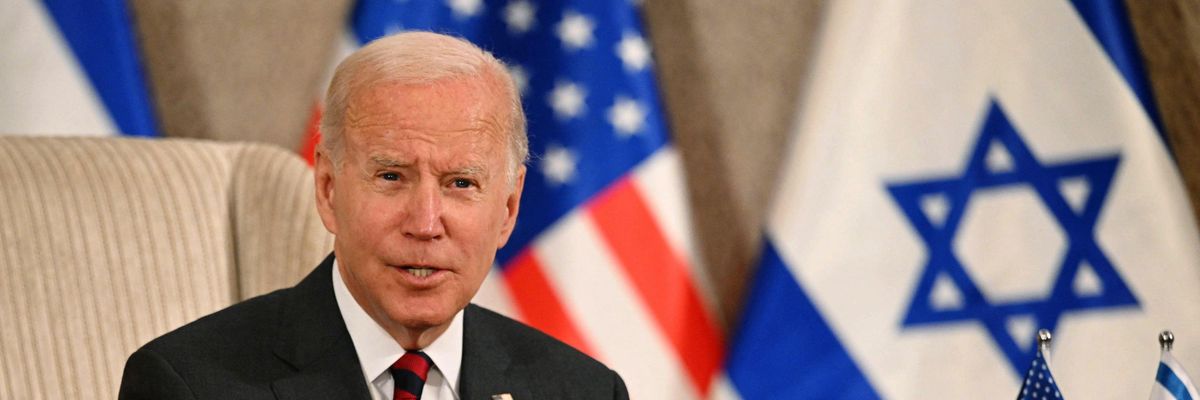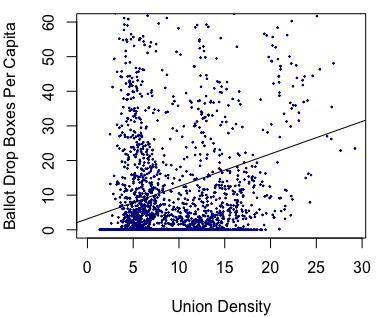"Why are they making these explosions other than part of their plan of forced displacement?" asked one human rights advocate regarding Israel's demolition of more than 1,000 buildings in the planned zone.

A picture taken from southern Israel on January 24, 2024 shows destroyed buildings in the Gaza Strip.
(Photo: Jack Guez/AFP via Getty Images)
JULIA CONLEY
Jan 25, 2024
Along with openly flouting the Biden administration's demand that Palestinian territory not be reduced by Israel's bombardment of Gaza, human rights and policy experts on Wednesday said that Israel's efforts to create a so-called "buffer zone" by demolishing buildings near its border structure are a violation of international law.
After satellite imagery and verified online videos have for weeks shown the Israel Defense Forces (IDF) carrying out controlled demolitions of buildings, including some near the Israel-Gaza border, Israeli officials for the first time this week acknowledged they were pushing ahead with clearing border areas of residential and other buildings to create a "buffer zone."
The IDF said it aims to create additional "layers of security" following Hamas' October 7 attack on southern Israel, but with Israel's Channel 12 reporting that 1,100 out of 2,850 buildings in the planned half-mile buffer zone already demolished, experts posited that the clear aim is to further shrink the already densely-populated enclave.
"If the Israeli government wants a buffer zone, it has every right to create one in far larger Israel, but it has no right to seize land in Gaza, squeezing the 2.3 million Palestinians into an even tinier area," said Kenneth Roth, former executive director of Human Rights Watch (HRW).
Israel acknowledged the plans less than a week after videos of one of its most high-profile recent demolitions, that of Israa University, were posted online. The institution was destroyed when the IDF detonated more than 300 mines on the campus—an operation that would have required Israel to "have full control" of the site, one observer noted, suggesting that the military could not have been targeting Hamas as it has repeatedly claimed.
The Washington Post reported Wednesday that it has also verified recent videos showing the demolition of residential buildings about one kilometer from the fence separating Gaza and Israel, including one in which 11 buildings were destroyed at once.
"Civilian properties are protected under international humanitarian law," Basel al-Sourani, an advocacy officer for the Palestinian Center for Human Rights, told the Post. "These houses are empty, and nobody is in them. Why are they making these explosions other than part of their plan of forced displacement?"
"Now with this 1-kilometer buffer they are talking about, and I'm sure it's more, what are we going to do?" he added.
Matt Duss, executive vice president at the Center for International Policy, noted that the Biden administration has previously suggested it would be against the construction of a buffer zone within Gaza's borders, with Secretary of State Antony Blinken saying in November that the U.S. would support "no reduction in the territory of Gaza."
But on Thursday, Al Jazeera reported that the Biden administration's position on the issue is now "subject to some uncertainty," with National Security Council spokesperson John Kirby reiterating that Gaza's territory should not be reduced but Blinken saying the White House may support a buffer zone for some amount of time.
Blinken said on Tuesday that security measures enabling Israelis to return to their homes in southern Israel may be "appropriate."
"If there need to be transitional arrangements to enable that to happen, that's one thing," he said. "But when it comes to the permanent status of Gaza going forward... we remain clear about not encroaching on its territory."
Geoffrey Nice, a former U.N. war crimes prosecutor, toldAl Jazeera that Israel's "landgrab" of farmland near the border which is "crucial to Gaza's economy" is clearly illegal.
"If you want to a demilitarized zone that you're going to fill with landmines, why not have it on the Israeli side and stop people crossing it?" Nice told the outlet. "What they're proposing, effectively and in anyone's interpretation, is occupation."
"But the process has already started," he said. "A large number of buildings have already been flattened. It is unjustified, by any view, under international law."










